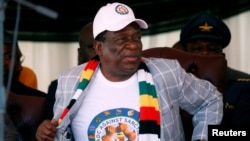United States President Donald Trump has extended by one year sanctions against Zimbabwean President Emmerson Mnangagwa and his inner circle saying the new government’s policies continue to pose an “unusual and extraordinary” threat to Washington’s foreign policy.
In a press statement, President Trump said Harare has failed to reform since 2017 after the ouster of the late President Robert Mugabe. The Trump administration said the Zimbabwean government has “arguably accelerated its persecution of critics and economic mismanagement in the past year, during which security forces have conducted extrajudicial killings, rapes, and alleged abductions of numerous dissidents.”
However, Deputy Information Minister Doctor Energy Mutodi accused Washington of pandering to the Zimbabwean opposition and former colonial power, Britain.
“We have been expecting them to do what they have done. They have always been insisting on human rights, on economic and political reforms, which our president (Emmerson Mnangagwa) has said if such reforms are to be implemented in this country, they are supposed to be people driven and for us as the people of Zimbabwe, not dictated by other foreign powers.
“We are disputing these sanctions as illegal and unwarranted because this is a bilateral issue between Zimbabwe and Britain which was escalated to the EU, which was escalated to the United States of America. So these sanctions we are saying as government, they need to be removed without any conditions, because we know where they are coming from, they are coming from the exercise of our land reform which we carried out to fulfill the interest of the electorate, the people who vote for us.”
Mutodi though says Harare is still willing to engage Washington.
“So Americans, the EU (European Union) and so on, America in particular, they have put the ZIDERA (Zimbabwe Democracy and Economic Recovery Act) which prohibits us from borrowing from other countries, from accessing credit lines, and so on. And they are doing this to punish us, to ensure that our people can suffer and then at the end of the day, ditch the Zanu-PF government and vote for the opposition. Now this is something that is very much unacceptable, and we as a country we are saying we are reengaging with the United States of America through our ministry of foreign affairs, and also through the Embassy.
“We are reengaging with the United States so that at the end of the day, we expect them to have a changed mind – a different view all together that we are a government that deserves to be in office and whatever policy we are implementing is for the good of our people.”
Opposition Movement for Democratic Change secretary for International Relations, Gladys Hlatywayo, says the Zimbabwean government has only itself to blame.
“We have always insisted as MDC that in order to get rid of these measures, we need to implement reforms. It’s unfortunate that the (President Emmerson) Mnangagwa regime has been going to town and lying to the international community to say we are implementing reforms, when in actual fact they are not doing anything. If anything, there is regression in Zimbabwe, if you look at the amendments that are being proposed. We have been clear as the MDC that what we want is alignment to the constitution, implementing the constitution, rather than bringing amendments that are meant to further the interest of the ruling elite.”
“If you look at the role of soldiers, role of the military, in our politics, if you look at what happened on August 1 (2018), if you look at what happened in January 2019, if you look at what happened when we were planning our peaceful demonstrations, late last year, you will see that the conduct of the military is not in line with the constitution of the land, and human rights abuses are done with impunity, no one is brought to book and these are the issues the international community has always been raising, and for us to normalize our relations with the international community, we don’t need to be engaging PR (Public Relations) companies like what Zanu-PF is doing.”
The renewal comes despite calls by African leaders for the targeted sanctions to be lifted and Zimbabwe engaging three Washington-based foreign lobbyist.
The Harare administration has hired London-based BTP Advisers - which joins United States-based Mercury International Limited, Ballard Partners and Avenue Strategies—in a quest to help Zimbabwe return to the community of nations after decades of isolation. However, Jeff Smith, founding director of Vanguard Africa - a United States pro-democracy group - says Harare must simply reform.
“It was a futile exercise from the very outset, the fact that the Zimbabwe government under the auspices of the Foreign Minister S. (Sibusiso) B. Moyo even attempted to influence U.S. policy in this way, really was an indication of their misplaced priorities. Instead of reforming (former Zimbabwe President Robert) Mugabe era laws, and instead of abiding by the rule of law, abiding by Zimbabwe’s own constitution, regional and international human rights obligations, they decided to go the route of spending hundreds of thousands dollars on PR and lobbying firms in Washington, DC. This exercise was never going to work.”
Zimbabwean independent political analyst, Joey Mabenge, concurs.
In a clear sign that Washington was set to renew sanctions, Zimbabwe’s state security minister, Owen Ncube and former army general Anselem Sanyatwe were added to the list last year over what U.S. Secretary of State Mike Pompeo said was credible information of their involvement in “gross violations of human rights.”
U.S. targeted sanctions apply to only 86 Zimbabwean individuals and 56 entities (mostly farms and legal entities owned by the 87 individuals) as of February 2020.
The Zimbabwe sanctions program implemented by the Office of Foreign Assets Control (“OFAC”) began on March 7, 2003, when then President George Bush issued an Executive Order imposing sanctions against specifically identified individuals and entities in Zimbabwe. Former Barack President Obama also maintained the sanctions regime during his 8 year tenure.




